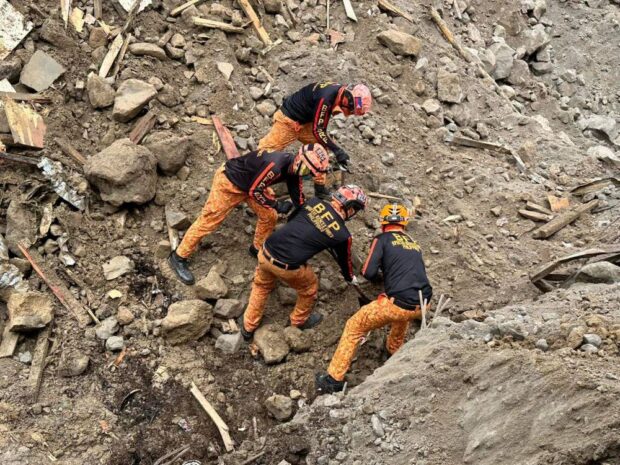Survivors now shun landslide-hit village

Retrieval Operation at Brgy Masara, Maco, Davao de Oro | 11 February 2024. (Photo from Bureau of Fire Protection Region Xi Davao Facebook page)
MAWAB, DAVAO DE ORO—Ernesto Badana Jr. had been a “tumindok” (old-timer) in the upland village of Masara, in Maco town, Davao de Oro province for over 20 years.
Despite being a longtime resident there, the 43-year-old mine worker of Apex Mining Co. Inc. (AMCI) never wanted to build a sturdy and permanent home in Masara.
“That area is not a good place to bring your family,” Badana said in the vernacular.
For locals like Badana, Masara’s topography is akin to a “kawa” (cauldron), where the community is surrounded by menacingly steep mountainsides.
But work and economic opportunity had drawn him and other families to play with fate. In Badana’s case, he built a makeshift hut at Zone 1, so small that it would be uncomfortable for his wife and children to stay in.
Article continues after this advertisementIn its initial assessment, the Mines and Geosciences Bureau (MGB) has considered the entire village of Masara as not safe for habitation and building settlements, provincial disaster risk reduction and management officer Joseph Randy Loy said.
Article continues after this advertisementThis means the local government has to relocate some 1,125 residents, per 2020 Census.
When rains dumped by the shear line fell on Masara on Jan. 16, Badana immediately asked his wife, Lady Grace, 33, and their two children to move to her family in Laak town, also in Davao de Oro.
“There were minor landslides then and many of our neighbors had already been ordered to evacuate at the school in an elevated portion in Masara,” Badana said.
While many of the residents had heeded the order of their village officials to go to the evacuation centers, Badana said many had returned home.
2008 tragedy
Masara village chief Douglas Dumalagan said many had become complacent as the sun was out and the weather was fine on the days leading up to the disaster.
As of 7 p.m. on Thursday, the Maco government said the death toll had climbed to 92, while the number of missing was down to 36.
When massive landslides hit the village on Sept. 6 and Sept. 7 in 2008, Badana was a village volunteer and among the responders. The tragedy buried the same part of the community and killed 25 people.
That disaster more than 15 years ago prompted the forcible evacuation of residents in Masara as well as some portions of the nearby village of Mainit. At least 120 houses were built in Kinuban village to relocate the affected families.
Masara had been abandoned, but not for long. As years went by, and the pain of loss had eased, people started to trickle back and settle in Masara.
Maco Mayor Arthur Voltaire Rimando said some people were supposedly urging others to return to the village “for their own personal benefit” even as the local government had declared Masara a “no build zone” upon the recommendation of the MGB.
“I say ‘personal benefit’ because Apex Mining is there and businesses can thrive as the mining firm employs not only those from Masara,” Rimando said.
‘Accessibility’
The mayor maintained that his administration was not remiss in reminding people of the risk in settling in the community. Doubling down on its no-habitation policy, the local government had stopped issuing permits for new settlements in Masara following the 2008 disaster.
On Thursday, the Department of Social Welfare and Development (DSWD) said it had distributed a total of P371.2 million worth of financial and social aid to families affected by recent calamities in Davao de Oro, including those displaced by the massive landslide in Maco town.
“There’s a lot of help coming in, but the difficulty right now is the accessibility [to] these places,” DSWD Undersecretary Diana Cajipe said in a briefing.
At least 333,668 family food packs worth P225.8 million had been sent to the displaced, she said.
Affected families, she added, were provided around P141 million in emergency cash transfer assistance which is only given to disaster-stricken areas under a state of calamity.
The provinces of Davao de Oro, Davao Oriental and Davao del Norte were placed under a state of calamity due to the impact of the rains brought by the shear line last month, affecting at least 600,000 people in the Davao region. —WITH REPORTS FROM KATHLEEN DE VILLA